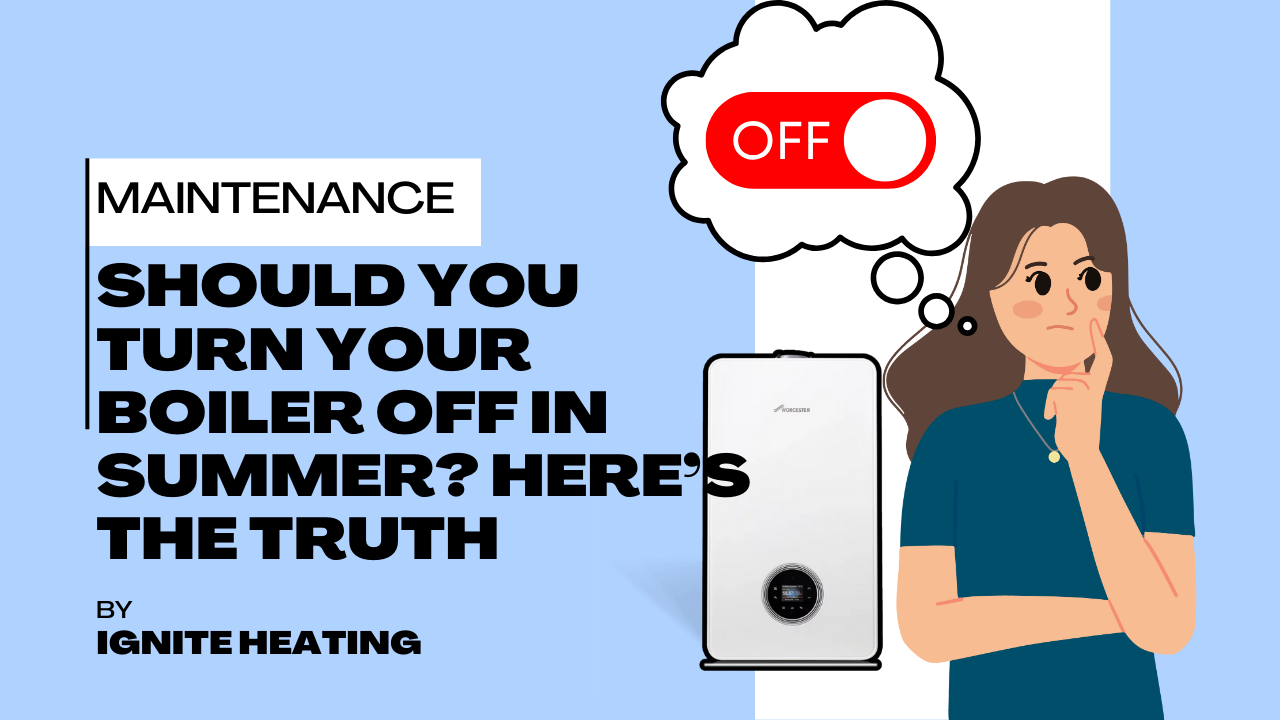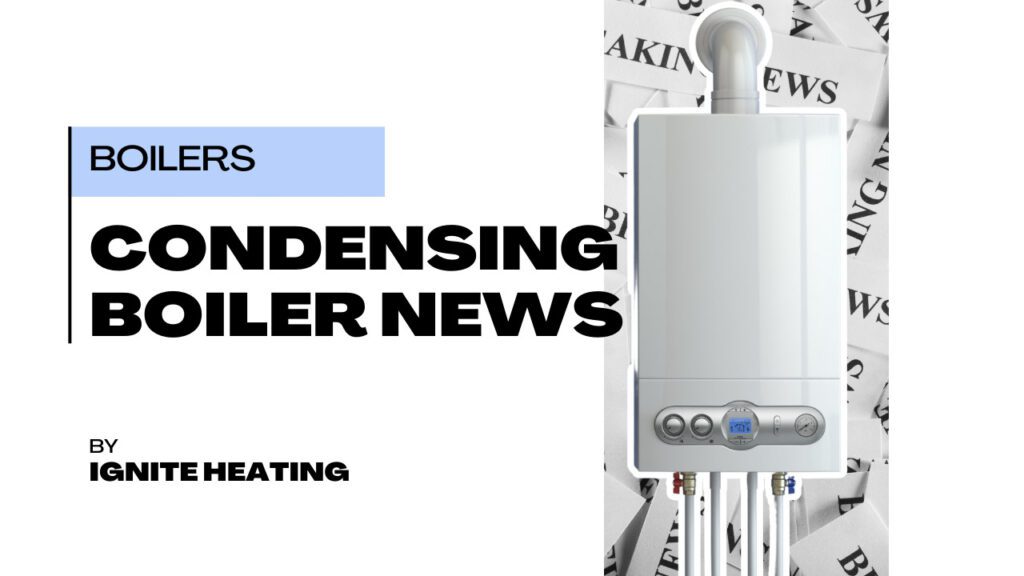
Should You Turn Your Boiler Off in Summer? Here’s the Truth.
Search Should You Turn Your Boiler Off in Summer? Here’s the Truth. Summer’s here finally. The sun’s shining (most days),

Lorem ipsum dolor sit amet, consectetur adipiscing elit. Ut elit tellus, luctus nec ullamcorper mattis, pulvinar dapibus leo.
Condensing boilers were developed in response to the need for more energy-efficient heating solutions and stricter environmental regulations. Traditional boilers were inefficient, expelling a large portion of their heat through the flue, which resulted in wasted energy and higher carbon emissions. To combat these inefficiencies, governments and manufacturers sought a way to recover this lost heat, leading to the development of condensing technology. Today, condensing boilers are the standard in many countries, ensuring that heating systems consume less fuel, reduce greenhouse gas emissions, and provide cost savings for homeowners and businesses alike.
A condensing boiler is a highly efficient heating system designed to capture and reuse heat that would otherwise be lost through the flue. Unlike older non-condensing models, which expel much of their heat into the atmosphere, condensing boilers use a heat exchanger to maximise energy utilisation. This process not only improves efficiency but also reduces fuel consumption and carbon emissions.

Condensing boilers function by utilising two heat exchangers to extract as much energy as possible from the combustion process:
The condensation process is key to achieving higher efficiency rates. Water vapour produced during combustion contains significant amounts of latent heat, which non-condensing boilers waste by expelling it through the flue. By reclaiming this heat, condensing boilers achieve efficiency levels of up to 90-98%, whereas older non-condensing models operate at around 70-80% efficiency.
Additionally, condensing boilers require a condensate drain to remove the liquid formed during the condensation process. This small amount of acidic water is safely expelled via a waste pipe connected to the drainage system. Proper installation and maintenance of this drainage component are essential to ensure smooth operation and prevent blockages or freezing during cold weather.

Because condensing boilers extract more heat from the same amount of fuel, homeowners and businesses can reduce their energy consumption, leading to lower gas or oil bills. Over time, the improved efficiency translates into substantial cost savings, making these boilers a financially sound investment despite their initially higher price tag.
By utilising more energy and wasting less, condensing boilers significantly lower CO2 output. Traditional boilers release a significant amount of heat into the atmosphere, whereas condensing models recover and use this excess energy. With climate change becoming an increasing concern, switching to a condensing boiler can be an effective way to lower a household or business’s carbon footprint and contribute to global sustainability efforts.
Modern condensing boilers can integrate with solar thermal systems or hybrid heat pump setups, making them a flexible option for those looking to enhance energy efficiency even further. These hybrid systems allow homeowners to rely on renewable energy sources when available while using their condensing boiler as a backup, reducing reliance on fossil fuels and further improving overall efficiency.
Many countries, including the UK and parts of Europe, have implemented stringent regulations requiring new installations to use condensing boiler technology. These regulations aim to phase out inefficient heating systems and promote energy-saving alternatives. Homeowners may also qualify for government grants or incentives when upgrading from older, inefficient boilers, making the transition to condensing models more accessible and cost-effective.
Governments worldwide are pushing for lower carbon footprints, which has led to widespread legislation requiring high-efficiency boilers in new builds and renovations. For example, in the UK, since 2005, all newly installed gas and oil boilers must be condensing models unless an exemption applies. This shift has forced manufacturers and installers to adapt to more energy-efficient solutions.
Rising energy costs and environmental awareness have driven increased consumer demand for condensing boilers. Homeowners and businesses are actively seeking ways to lower their heating expenses while reducing their impact on the planet. This demand has also encouraged competition among boiler manufacturers, resulting in continuous improvements in boiler design and efficiency.
Manufacturers are continuously improving condensing boiler technology to increase efficiency, reliability, and ease of maintenance. Smart thermostats and AI-driven heating controls now allow users to optimise their boiler’s operation in real time, further enhancing energy savings. Features such as remote monitoring, self-diagnosing fault detection, and weather compensation technology are becoming more common, allowing users to manage their heating systems with greater control and efficiency.

Selecting the right condensing boiler is crucial for ensuring optimal performance, energy efficiency, and long-term cost savings. Homeowners and businesses should consider various factors before making a decision, including property size, hot water demand, fuel availability, efficiency ratings, and technological features. Making an informed choice can lead to substantial reductions in energy costs and lower carbon emissions.
Consulting with a qualified heating professional can help you make an informed decision based on your specific heating requirements. Investing in the right condensing boiler will ensure greater efficiency, lower operational costs, and a reduced environmental footprint.
Condensing boilers tend to be more expensive than traditional models due to their advanced technology. However, the long-term savings on energy bills often justify the upfront investment. Many governments also offer financial incentives to help offset the initial costs, making high-efficiency models more accessible to homeowners and businesses.
To ensure maximum efficiency, condensing boilers require expert installation and regular servicing. Proper venting and drainage for the condensate must be considered to prevent operational issues. Homeowners should ensure they hire a qualified installer to ensure the system functions optimally and to avoid potential issues down the line.
Like any heating system, the lifespan of a condensing boiler depends on the quality of installation and maintenance. Regular servicing is essential to prevent blockages, leaks, or efficiency losses. With proper care, a condensing boiler can last up to 15-20 years, providing efficient heating and hot water for an extended period.
As the demand for energy efficiency and sustainability continues to grow, the future of condensing boilers is expected to evolve with new advancements and industry trends. One of the most significant changes in the future is the push towards hydrogen-ready boilers. Governments and manufacturers are investing in research and development to transition from natural gas to hydrogen-based heating solutions, which produce zero carbon emissions when burned. Many modern condensing boilers are being designed to be hydrogen-ready, meaning they can operate on a blend of 80% natural gas and 20% hydrogen.
Another major innovation in condensing boiler technology is the increased integration of smart home automation. Smart thermostats will continue to enhance the efficiency of condensing boilers, allowing for real-time adjustments based on weather conditions and occupancy patterns. Remote diagnostics and predictive maintenance capabilities will also improve, helping homeowners and engineers detect issues before they become costly problems.
Additionally, the industry is moving towards hybrid heating systems, where condensing boilers work in tandem with renewable energy sources such as solar thermal panels and heat pumps. These hybrid systems maximize energy efficiency while reducing reliance on fossil fuels, aligning with global carbon reduction targets.
Condensing boilers have revolutionized the heating industry by offering unparalleled efficiency and environmental benefits. With increasing regulatory requirements and a growing emphasis on sustainability, they are poised to remain a dominant technology in residential and commercial heating for years to come.
For homeowners and businesses looking to upgrade, investing in a condensing boiler is a smart choice—reducing carbon footprints while maximizing heating efficiency and cost savings. As technology continues to advance, condensing boilers will likely become even more integrated with renewable energy sources, driving the heating industry toward a greener future.

Search Should You Turn Your Boiler Off in Summer? Here’s the Truth. Summer’s here finally. The sun’s shining (most days),

Search Should I Upgrade My Central Heating System Before Winter? Winter in the UK can be brutal, with freezing mornings,
© 2024 Ignite Heating. All rights reserved